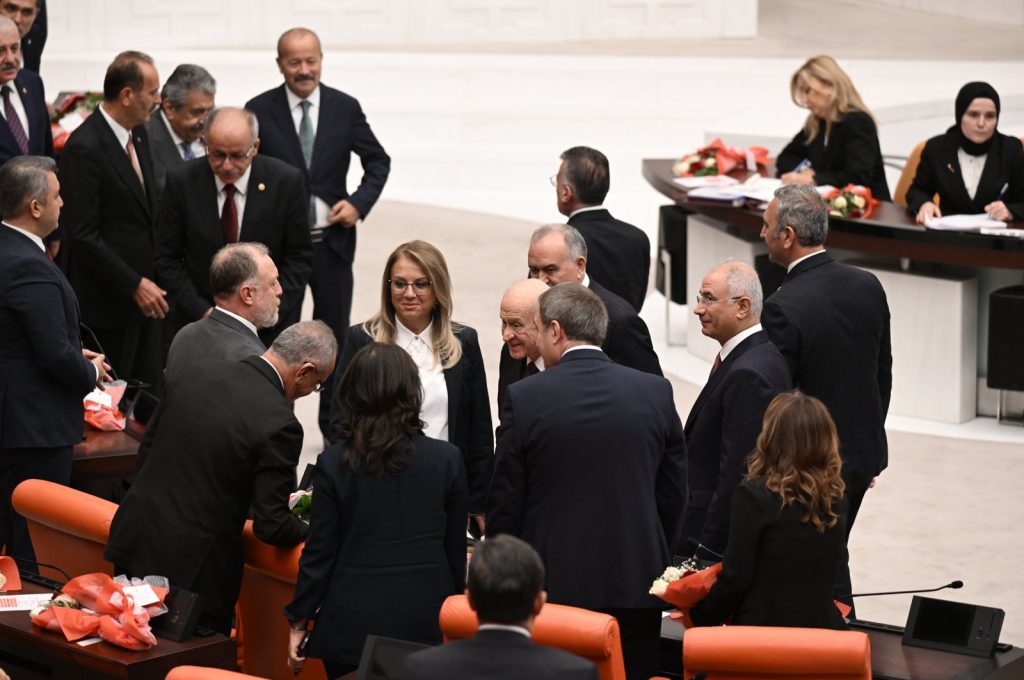The Turkish political scene is usually brimming with rifts and polarization. Tuesday’s Parliament opening session has painted a different and unfamiliar picture.
Just as we press members, foreign diplomats and ministers were heading to the gates to leave the grand hall of the Turkish Grand National Assembly (TBMM) after President Recep Tayyip Erdoğan finished his speech on the opening of the legal year, a small crowd gathered among deputies and we stopped to watch.
Devlet Bahçeli, chairperson of the Nationalist Movement Party (MHP) – an ally of the ruling Justice and Development Party (AK Party) – shook hands with members of the Peoples’ Equality and Democracy Party (DEM Party), formerly known as the HDP. Photojournalists did not miss the opportunity while everyone else tried to grasp what was happening.
It was the second incident that astonished attendees of the session. Earlier, when Erdoğan entered the hall to make his speech, the head of Türkiye’s main opposition, Özgür Özel and several of its deputies got up from their seats and applauded Erdoğan on their feet – another rare scene.
While the DEM Party was surprised by Bahçeli’s act, the Republican People’s Party’s (CHP) act was discussed priorly as some members stood up while others sat down. The contrast in attitude might reflect the divergence between the party, which is mainly split between those supporting Özel and those favoring Istanbul Mayor Ekrem Imamoğlu as their leader.
Following the Parliament session, we started to wait for the TBMM reception, which would take place hours later at the same compound, to try to get politicians to explain what these acts meant.
Indeed, Bahçeli, Özel, Good Party (IP) Chair Musavat Dervişoğlu and deputies from the DEM Party were present.
“We are entering a new era. If we want peace in the world, we should maintain peace in our country too,” Bahçeli told journalists.
The MHP, a decades-old far-right nationalist party with a traditional and nationalist constituency, is usually very strict on its views and stance toward the DEM Party.
In May, Bahçeli said, “The organic and organizational link between the HDP and the PKK have been legally registered.” He criticized the constitutional court for dragging its feet on closing down “the HDP and its follow-ups.”
Did the war trigger internal unity?
Offstage, multiple scenarios are being discussed as to what lies behind Bahçeli’s move.
The first why and wherefore is that it could be part of the “normalization among political parties,” which would also explain Özel’s move. Following the March 31 local elections and the main opposition’s success at the polls, a new approach was adopted by the CHP and the AK Party, aiming to normalize their dialogue. The process saw a series of mutual visits and consultations on common challenges such as foreign policy and the economy. Bahçeli, previously, had criticized this normalization.
A day later, DEM Party co-Chair Tuncer Bakırhan said: “There is nothing anormal. It is a scene that should be normal under the roof of Parliament. Everyone might be shocked because, to this day, we have not witnessed any negotiation or dialogue.”
He continued to say that war is unfolding in the neighborhood and “we do not know where it will spread. We need more dialogue than ever during this process.”
Thus, a second, and again strong rationale could be the fact that Türkiye is alarmed by the recent incidents in the Middle East as Lebanon, Iran and Israel are escalating. In the face of the growing conflict rooted in Gaza and spreading regionally, Ankara calls for internal unity to concentrate its foreign policy unitedly on common challenges.
Returning from New York’s U.N. General Assembly last month, Erdoğan emphasized internal harmony, saying: “The internal front is the values that define us. If there is a problem, we will solve it. If there is distress, we will overcome it together.”
Again, at the parliamentary session, he added: “This must be understood – today, areas of reconciliation must come to the fore instead of conflicting areas inside and outside vis-a-vis Israel’s aggression. The Israeli administration, after Palestine and Lebanon, will set its sights on our nation’s territories.”
Two less likely possibilities are that the ruling coalition is considering taking new steps on the Kurdish issue or that the coalition might attempt to garner support for a planned new constitution.
Erdoğan’s government has been pushing to overhaul Tükiye’s Constitution for over a decade now, which was enforced in 1982 following a military coup that led to the detention of hundreds of thousands of people along with mass trials, torture and executions, which still represents a dark period in Turkish political history. However, at least 400 lawmakers must ratify a new constitution draft in Parliament. Anything over 360 votes would allow a referendum, allowing the people to decide. The People’s Alliance doesn’t have a parliamentary majority.
Bahçeli, who has been leading the same movement for many years now, conducts a great part of his politics through symbols. Although the MHP is not vital in gaining votes, it has a significant influence over the AK Party, the military and other security bodies. Viewed from this aspect, Bahçeli’s DEM Party and CHP move must not be read as a simple development or random act. It is highly likely that the move has been planned by Erdoğan and has the potential to set the light for a new kind of politics in Türkiye. What Bahçeli means by “entering a new era” remains to be seen in the future.


